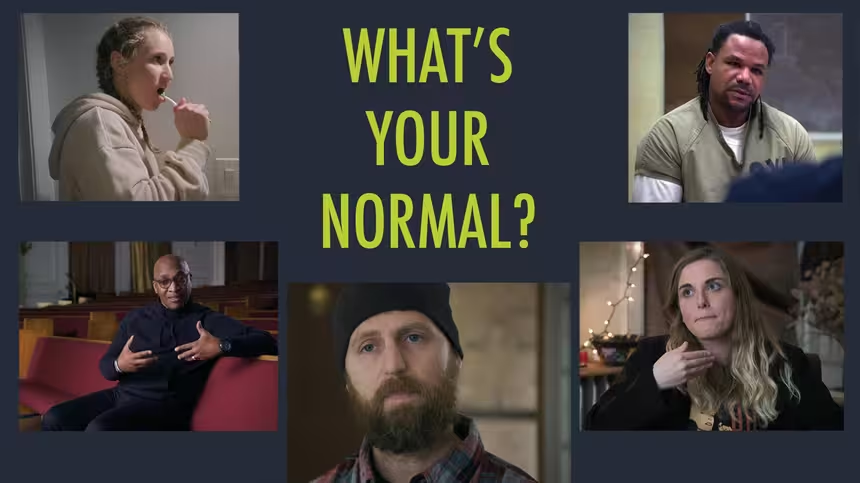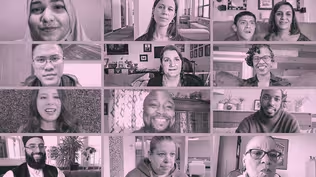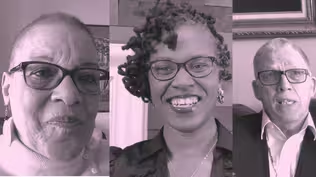
Linh An and Sharyn Luo | Decolonizing Mental Health
Special | 5m 14sVideo has Closed Captions
A good mental health treatment process must include families and friends.
Why does a medical emergency allow family members to enter the ER while a mental health emergency singles out the patient? In Asian communities, where the family is the core of all societal relations, a completely avoidable stigma pits the family against the healthcare system. A collective mental health pandemic can only be addressed through solutions that are social and familial.
Problems playing video? | Closed Captioning Feedback
Problems playing video? | Closed Captioning Feedback
Funding for Mysteries of Mental Illness is provided by the Corporation for Public Broadcasting, Johnson & Johnson, the American Psychiatric Association Foundation, and Draper, and through the support of PBS...

Linh An and Sharyn Luo | Decolonizing Mental Health
Special | 5m 14sVideo has Closed Captions
Why does a medical emergency allow family members to enter the ER while a mental health emergency singles out the patient? In Asian communities, where the family is the core of all societal relations, a completely avoidable stigma pits the family against the healthcare system. A collective mental health pandemic can only be addressed through solutions that are social and familial.
Problems playing video? | Closed Captioning Feedback
How to Watch Mysteries of Mental Illness
Mysteries of Mental Illness is available to stream on pbs.org and the free PBS App, available on iPhone, Apple TV, Android TV, Android smartphones, Amazon Fire TV, Amazon Fire Tablet, Roku, Samsung Smart TV, and Vizio.

Join the Campaign
Share your story of dealing with mental illness through textual commentary, a still image, a short-form video — however you feel most comfortable — using the hashtag #MentalHealthPBS on social media.(chimes chiming) (water dripping) - Our culture is so family and collectively oriented that the stigma for mental illness transfers over.
(solemn music) I grew up in Queens, New York.
- I was born in Southern China.
It's a city called Guangzhou.
I came to the United States at the age of 15 years old.
- I have a brother, a sister, then me, and a brother.
- I was raised as the only child because of the government policy, so everyone is the only child.
- It's a two-family house, my nuclear family, and then on the lower floor, it'd be like, my grandparents, and two aunts and uncles.
- I'm working in a community health center now as a medical social worker.
- I am an anthropologist.
My family, they're Chinese-Vietnamese.
They came after the war.
Immigration is a stressor itself.
I've looked at the experience of these families that I work with.
In anthropology, and in a lot of other different fields, we often think about the patient or the consumer, but we don't really think about the family, I'm a also a family member that has someone that has mental illness.
It always felt like it was the family against the system.
It's probably because the mental health system is very egocentric.
It's this idea that this person can make an informed decision, and we have to protect their privacy and rights, but I don't know if that's always the ways that people function in families, or in different cultures.
- When someone in the family is not doing well, the whole family may feel guilty, or feel responsible.
(water dripping) That's kind of a reciprocal stigma.
People who have a family member are suffering mental illnesses, they internalize the stigma, or in the society, they also have questions, and they may have suspicions, maybe it's the family did something to the person.
They may question the parents.
Did you do something wrong?
If you're not polite enough parenting.
- The patient is often told by the family members, don't tell.
Don't tell the condition or anything.
There's also vast cultural beliefs that in a lot of ways is very pragmatic.
You could still think that it's a psychiatric illness, but still go to a traditional healer.
- When we see things that are not explained, people may link it to, maybe our ancestor did something wrong, so that pass on to our next generation.
(soft music) - Part of making care more culturally competent is to include the family, because decision-making isn't just the person that's getting the services.
Oftentimes, they do live with their family members.
Letting the families know that their input and their opinions matter and is valuable is important.
When it comes down to it, when that patient relapses and goes into ER, it's their family member that's with them.
And to be like, no, you can't be there, right, it's very disrespectful.
- Sharing some cultural understanding with our clients will provide empathy, not to judge, to shun.
In recent years, because of the media, because of the education, people tend to feel a little bit more familiar.
Especially nowadays, we also see more people are experiencing depression and anxiety.
It's not that uncommon, actually.
I believe all of us experience downtime in our life.
I myself experience some.
Maybe that's how I get motivated to support people who are in their difficult times, too.
I couldn't imagine how important it is for people who are experiencing the darkest time in their life, they just wish a little bit help for them to step out of the dark hole.

- Science and Nature

Explore scientific discoveries on television's most acclaimed science documentary series.

- Science and Nature

Capturing the splendor of the natural world, from the African plains to the Antarctic ice.












Support for PBS provided by:
Funding for Mysteries of Mental Illness is provided by the Corporation for Public Broadcasting, Johnson & Johnson, the American Psychiatric Association Foundation, and Draper, and through the support of PBS...

